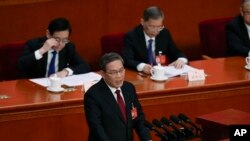China’s top leaders set an ambitious economic growth target of 5% for 2024 Tuesday, vowing to “seek progress while maintaining stability” amid a sluggish economy and weak confidence among investors and consumers.
Delivering his first work report since assuming the second-most powerful position in China last October, Chinese Premier Li Qiang acknowledged that China faces an environment characterized by opportunities, risks, and challenges but emphasized that favorable conditions still outweigh unfavorable factors, according to China’s official Xinhua News Agency.
In the face of weak economic growth worldwide and the lack of a solid foundation for China to stabilize its economic growth, Li said Beijing will continue to adopt “proactive fiscal policy and prudent monetary policy” to cope with the long list of economic challenges.
According to Li, the Chinese government plans to issue about $139 billion in special treasury bonds over the next few years while offering support to debt-laden local governments and sticking with the strategy of “high-quality growth,” which focuses on driving growth through innovation.
Li said China would mobilize resources across the country to “promote the construction of a modern industrial system, accelerate the development of new productive forces,” and allow innovation to drive economic growth, according to readouts on China’s state-run Xinhua news agency.
Li’s speech comes as China faces a long list of economic challenges, including an ongoing real estate crisis, low consumer and household confidence, and weak external demand. While Li promised to expand domestic demand and increase efforts to attract foreign investment, some economists say that unless China initiates fundamental economic reforms, these plans may only be “policy slogans.”
“A lot of the strategic industries in China are controlled by state-owned enterprises and their investment efficiency is quite low,” Wang Kuo-chen, an expert on the Chinese economy at the Chunghwa Institute for Economic Research in Taiwan, told VOA by phone.
In his view, even if China tries to increase support for private enterprises, state-owned enterprises, or military enterprises continue to control strategic industries in the country, it will be difficult for the Chinese government to emerge from the current economic turmoil.
“If Beijing doesn’t fundamentally change its economic model, it’ll be hard for China to implement new economic strategies such as high-quality development and new productive forces,” Wang told VOA.
Despite the doubt expressed by some economists, other analysts say the Chinese government will continue to concentrate resources on technological innovation in the near future.
“The whole government work report is focusing on modernization with Chinese characteristics and new productive forces,” Wang Hsin-hsien, an expert on Chinese politics at National Chengchi University in Taiwan, told VOA in a phone interview.
He said a large part of Li’s speech focuses on technological innovation, which may also be Beijing’s response to the U.S.-led effort to restrict its access to some core technologies, such as advanced semiconductor chips. “These policy proposals have a lot to do with challenges that China faces internationally,” Wang said.
Apart from the outline of Beijing’s economic measures over the next year, Li Qiang also highlighted the need for China to strengthen social security and services, including a comprehensive strategy to cope with its rapidly aging population and measures to tackle youth unemployment.
Since China’s National People’s Congress passed revisions to the state secrets law just days before the “Two Sessions,” Li reiterated the need for the Chinese government to “safeguard national security and social stability.” “[We should] the overall concept of national security while strengthening the national security system,” he said in the speech.
Some analysts say Li’s speech shows that security remains the top concern for the Chinese government. According to statistics shared by Ruihan Huang, a senior associate at Chicago-based think tank MarcoPolo, the word security was mentioned 28 times in this year’s government work report, which is three times more than last year.
As Li doubled down on the importance of prioritizing national security in his speech, some experts told VOA that such a governance model imposes a cost on the Chinese economy. “When [a government] invests one unit more in security, in the short term, it at least means one unit less in something else, including in growth,” Ian Chong, a political scientist at the National University of Singapore, told VOA by phone.
While some analysts describe Li’s speech and the content of China’s government work report as “unsurprising,” the Chinese government’s decision to cancel the premier’s press conference at the end of the annual legislative meeting is still a precedence-breaking move that reflects the diminishing power that the premier possesses under the current Chinese political system.
The Chinese government “has redefined the role of premier as an implementer of decisions made by the Politburo, a top decision-making body, under the general secretary’s leadership,” Dali Yang, a political scientist at the University of Chicago, told VOA by phone.
As the world now interprets the signals reflected through Li Qiang’s speech Tuesday, Chong in Singapore thinks the outside world’s perception of China will likely remain unchanged in the short term.
“Ultimately, what investors want is certainty, and for there to be more certainty, there has to be more transparency in data and that compliance is straightforward to follow,” he told VOA. “While Li Qiang talks about confidence, the instruments that allow for confidence aren’t really there.”




